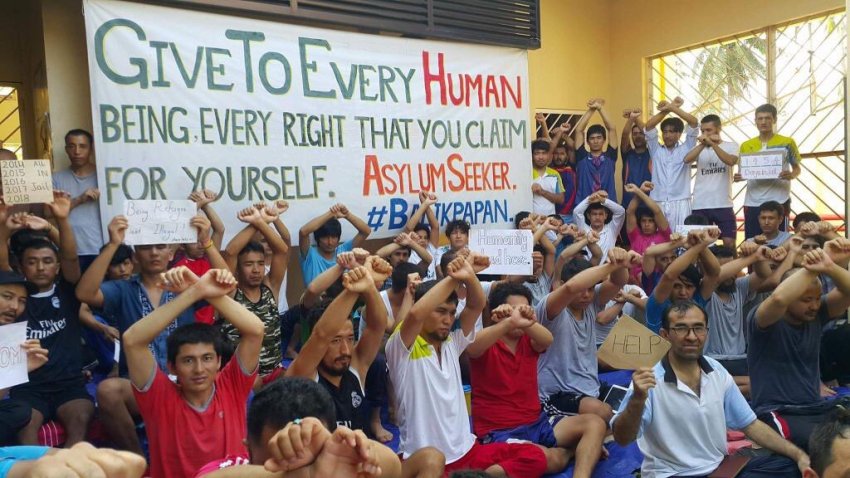
Hundreds of refugee families defied a protest ban in the Indonesian city of Makassar on Sulawesi on February 21.
They marched from their refugee accommodation to the office of the United Nations High Commissioner for Refugees (UNHCR) with banners and placards that read “No one is illegal” “Is there any UNHCR?”. A young girl held up a placard, almost as tall as her, that read “We are forgotten”.
They are representative of an estimated 30,000 asylum seekers and refugees living in Makassar. Some have been there for five years and many received UNHCR refugee status years ago. Others are more recent Rohingya refugees who fled ethnic cleansing in Myanmar.
These are just some of the people waiting in Australia’s self-described “queue”. They have been told by the UNHCR they have less than a 1% chance of being resettled in a UNHCR resettlement program.
At the rally they called for faster action from the UNHCR on their claims and for Indonesia to respect their human rights.
Indonesia is not a signatory to the UNHCR refugee convention and as such has no obligations to refugees and will not resettle anyone. In theory it acts as a transit country where refugees are allowed to stay while they await resettlement.
In Makassar, refugees have reported being beaten by police and security forces for breaking rules such as having guests in their room after 9pm. They are also not allowed to protest.
In Indonesia, refugees are effectively second-class citizens. They are not given work permits and cannot access public services such as health care and education. Many live in severe poverty and are forced to work in highly exploitive jobs with no rights just to survive.
Across the sea in Balikpapan in Borneo, on the same day as the Makassar protests, the Indonesian director of general immigration Ronny Franky Sompie visited the overcrowded Balikpapan detention centre as refugees inside entered their 36th day of protest at the conditions.
The detention centre is one of 13 in Indonesia, set up in 2009 with the help of the Australian government as one of its regional solution initiatives.
Balikpapan detention centre was formally a prison. It comes with cctv cameras and high voltage fences.
Refugees hold up placards up in the rain, worried they might get ruined as they used the last of their paper to make them. Some of the placards read: “DJI [Director of General Immigration] Please give us human basic right ‘freedom’” and “1223 (days in detention) Homeless Hopeless”. Others cross their arms above their heads — as refugees on Nauru and Manus Island do in protest.
Sompie left them in the rain without any indication they would ever be given equal rights or resettlement.
They returned the next day with rain soaked placards. Some have been locked up since 2012. Many are Hazaras who fled the Taliban and now Daesh (ISIS) in Afghanistan.
One young man is only 14 years’ old, having arrived when he was 12 as an unaccompanied minor. Another desperately needs surgery on his broken back. Others suffer from scurvy and other tropical diseases. There are few medical services and little food.
Under Indonesian law the government can detain people for 10 years without judicial review. They feel, as one man wrote on a placard, they are the “Forgotten refugees”.
In Indonesia’s capital, Jakarta, there are thousands of refugees sleeping rough on the streets. The streets outside prisons converted to refugee housing are lined with people hoping for shelter in the overcrowded buildings.
Most of the aid, especially legal aid, is provided by NGOs. Many are living off what money they had before they came to Indonesia or funds sent from their family. There are stories of refugees finding work to pay for medical costs and food only to be thrown into jail for working without a permit.
It is living for years in these conditions, without rights and access to services, that makes people get on boats. Some are now on Manus Island and Nauru. Others have had their boats turned back to danger.
In early 2014, then immigration minister Scott Morrison announced that Australia would not resettle any refugees who registered with the UNHCR in Indonesia after July 1. The reason, he said, was to stop Indonesia being used as a transit country for people smugglers.
In the lead up to the 2001 election then Prime Minister John Howard said: “We will decide who comes here and the manner in which they come”.
Since then, there has been constant rhetoric that refugees need to come in the correct “manner”. But under Australian law there is literally no legal way for the Rohingya who fled to nearby Makassar to apply for asylum in Australia.
Australian policies, combined with the US significantly lowering its refugee intake, have effectively turned Indonesia from a “transit country” to a “destination country” for many refugees.
While there is a campaign for Indonesia to become a UNHCR signatory, it has consistently stated it is only a transit country and will not resettle anyone.
When Coalition and Labor politicians talk of stopping the boats and people taking the “correct pathways”, the reality is they are forcing people to live as second-class citizens in a country that does not want them, with no hope of a future.
In the upcoming Palm Sunday rallies on March 25 we must make sure the “forgotten refugees” are heard.
Like the article? Subscribe to Green Left now! You can also like us on Facebook and follow us on Twitter.